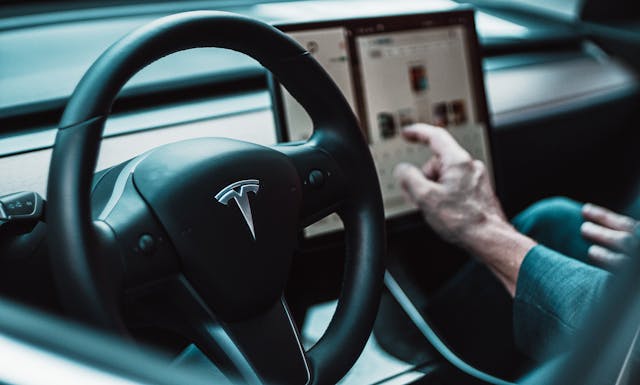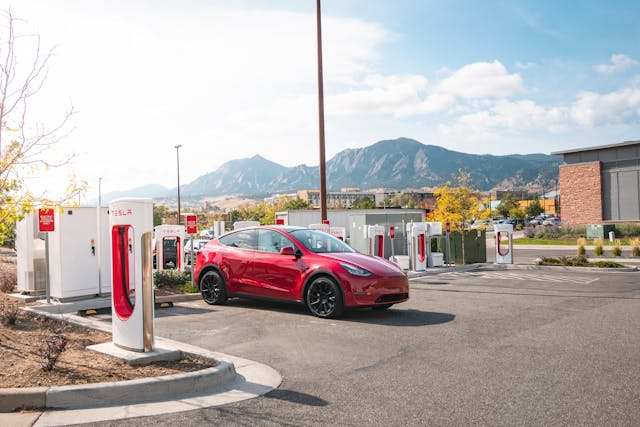Reuters: Tesla purposely exaggerated dashboard range estimates, dismissed customer complaints
Reuters has distributed a devastating investigative story that accuses Tesla of not only exaggerating battery range estimates on its cars but creating a “diversion team” in Las Vegas tasked with one mission: Push consumers who thought something was wrong with their Tesla to cancel the service appointments they booked.
Based largely on an anonymous source that is mostly referred to as “this person,” the story says, “About a decade ago, Tesla rigged the dashboard readouts in its electric cars to provide ‘rosy’ projections of how far owners can drive before needing to recharge, a source told Reuters.”
Last year was an enormous sales year for Tesla, with roughly 1.3 million vehicles delivered. Inundated with driving-range complaints from customers, some of whom thought something was wrong with their vehicle, the company saved Tesla about $1000 in expenses per cancellation, the story says.
Owners “expected better performance based on the company’s advertised estimates and the projections displayed by the in-dash range meters of the cars themselves, according to several people familiar with the matter,” Reuters reports.

Inside the Las Vegas team’s office, “some employees celebrated canceling service appointments by putting their phones on mute and striking a metal xylophone, triggering applause from coworkers who sometimes stood on desks. The team often closed hundreds of cases a week and staffers were tracked on their average number of diverted appointments per day.”
Indeed, the customers’ cars likely did not need repair. They were performing as designed, but not as advertised. (In instances where an issue unrelated to range was discovered, Reuters reports from one source, advisors were “instructed not to tell the customer” and to close the case. It’s unclear if said issues were nonetheless rectified remotely.)
As usual, neither Tesla nor chief executive Elon Musk responded to detailed questions from Reuters for this story. The company shuttered its public relations operation in 2020. “The directive to present the optimistic range estimates came from Tesla Chief Executive Elon Musk, this person said. ‘Elon wanted to show good range numbers when fully charged,’ the person said, adding: ‘When you buy a car off the lot seeing 350-mile, 400-mile range, it makes you feel good.’”
Reuters said it could not determine whether Tesla still uses algorithms that boost in-dash range estimates. “But automotive testers and regulators continue to flag the company for exaggerating the distance its vehicles can travel before their batteries run out.”

Tesla, the story says, conducts additional tests beyond the EPA’s standard formula to determine its own range estimates. The EPA conducts audits on 15 to 20 percent of all new EVs, and it forced Tesla to downgrade its final range estimates for window stickers by an average of 3 percent. While other automakers can do the same, many—including Ford, Porsche, and Mercedes-Benz—stick with the EPA formula.
Tesla was fined earlier this year “by South Korean regulators who found the cars delivered as little as half their advertised range in cold weather. Another recent study found that three Tesla models averaged 26 percent below their advertised ranges,” the story says. Last month, Mandated by South Korean regulators, Musk and two local executives admitted to “false/exaggerated advertising.”

***
Check out the Hagerty Media homepage so you don’t miss a single story, or better yet, bookmark it. To get our best stories delivered right to your inbox, subscribe to our newsletters.



VW got slapped pretty hard for diesel “optimism”. Will be interesting to see if this story on Tesla has legs…
Anyone who would re-platform a purveyor of wrong-think attitudes should be crushed by any means neccessary.
Everyone knows that the driver has a tremendous influence on fuel or battery consumption. I remember an article about Tesla that said the same thing about range but Tesla had the data to prove the author entirely wrong and purposely misleading. He had driven much more than he claimed and Tesla had the data. My recent experience with a Mach E had much MORE range than displayed on the dash when driven by me and less than displayed on the dash when driven by someone whose road manners had a lot to be desired.
Re-read the article.. Yes, driving style, road conditions and many other factors will influence range or mileage, however, Tesla IS doing something wrong here, beyond how a person drives..
Exactly! Your mileage may vary.
In keeping with Musk’s penchant for “rebranding” his various enterprises (Twitter now known as “X”) the only logical move would be to rename Tesla as “Stanley,” convert the motive power to steam and and decry the use of electricity because it’s too unreliable. Just sayin’….
And they keep ramming this UNRELIABLE electric car bs up our butts. I’ll give up my ICE when you can pry my cold dead fingers from em!
Also fitting because ultimately they both run on the same source, coal.
I remember when we took calls for repair appointments at Tesla and convinced the customer that the steering wheel that fell off while driving was a safety feature !
Would you like to share the context? Did it have anything to do with break away steering wheels that are designed to give way so they do not impale the driver? Everything in the passenger comparment is designed to break away, from the dash to the door knobs.
There is a report saying EV’s lose 31% of their range at 100 degree temperatures. EV’s are far too sensitive to temperatures, what items you are running in the vehicle it seems. My gas powered car will lose some mileage but not anywhere near the swings these vehicles can have. I’m still not impressed by the EV cult but all the “educated” people around me are buying them. No thanks.
What kind of vehicle loses efficiency in high temperatures? My 50 years of experience has always been they are most efficient at high temperatures? And the loss can be 20% at sub zero temps for both gas and electric.
You have 50 years of experience with EVs?
I keep pretty close tabs on my mileage in my 20 year old commuter. I do lose some mpg, but that’s mostly because it spends more time idling to cool it down when it’s 105 in Texas.
But I’d bet a lot of lost range in an EV is the energy spent to cool the battery packs while the car just sits in a hot parking lot. You not only have the ambient temperature to deal with, but the radiant heat off the hot concrete under the parked car.
Not a fan of EVs either. If you had a 80 to 100 mile commute round-trip each day, 5 days a week, that an EV could PERHAPS be more economical than a Corolla. But you still have to pay some amount for charging, and you still have to replace tires. For most folks, I don’t think the economics really works. Plus, more than a few writers (Dan Neil for the WSJ comes to mind) have done road trips in EVs, to see if it could be done as conveniently. In most cases, it was decidedly less convenient, and more time consuming.
You might recheck your math. Mine comes out to be about 70 mpg equivalent at the super charger station price, 140 mpg at the normal home watt price and 210 at the reduced night time rate. What numbers are you using.?
Hello Mr 77GL. I suggest that you recheck your numbers. The normal PG&E rates are 35 and 44 cents per kWh once you exceed their studio apt baseline. Once you switch to having an electric vehicle – yes you get a discount to charge your car at night at 28 cents. However, you are also forced into TOU rates for the rest of your electricity and pay up to 64 cents for the electricity you use between 4 – 9 PM. That’s when you get home from work and need to run the AC, cook, do laundry, watch TV etc. PG&E is no charity – yes you get a discount to charge at night – but then they bend you over the rest of the time. Don’t forget to account for that.
I drive from the Northwest to So. California with my two dogs about 9 times a year. I can’t imagine trying to do 650 miles each day, two days in a row in an EV. And if it gets cold, which it often is in the mountains, you lose charge. I can’t picture me entertaining them for an extended time every 250 miles or so.
You also have to factor in the cost of a battery pack replacement if you plan to keep the car for anywhere near the average age of a car on US roads (~13 years), and range loss as the battery degrades. Or you’re constantly in a car payment to have a newer EV.
Another of today’s non-journalists reporting that “the guy said” as if I would ever believe it.
Also this story at the end deflects to S. Korea and doesn’t give any of this legs to stand on.
Hagerty, you can do better.
Yes, Hagerty could do better. I recently watched a video in which a journalist stated that you should ignore any article in which the headline quotes someone else (in this case Reuters). Quoting another source releases the publisher from any legal responsibility for accuracy.
Tesla = Fake. Always did.
I agree that we must reduce our impact on the environment. That said, there are simply far too many issues with the electric platform to say it is the answer. The mining has some veery serious concerns and in particular the fact that mining is said to have to increase by 1000 times worldwide in order to fulfill the global needs of producing car batteries. And yes, they can now recycle car batteries, however it costa about 4 times as much to recycle one as it does to make a new one, sit it is very unlikely that they will be recycled. Then the whole conversation about deep sea mining where there are some estimated 40,000 species of sea life, unknown to man because of the depth that we are just going to brush aside.. and on and on… Far too many questions unanswered and too many unproven theories, and then stories like this one above. Yes we must do something, however, what about hydrogen? We can use our proven ICE technology and the by product is water vapour, which, with global warming and droughts, what could be better? Work on the electric technology as an aside, however we are simply not there yet! From mining to disposal, from range anxiety to electrical infrastructure, far too many unanswered questions as the world collectively runs from one “bad” technology in the ICE to another with far too many questions unanswered in the electrical vehicle platform.
One other thing to note: As of now, lithium battery recycling only results in the recovery of about 50% of the materials. As opposed to lead acid batteries where over 90% is recovered.
I bet most of the electric car producers are fibbing.
Most are fibbing,some are flat out lying !!!
Owning a tesla’s is based on religion not science. primarily problematic is the grid needed to plug it into charge. Secondly lithium batteries have limited life cycle some claim 1000 charge discharge cycles. The faster you charge discharge and the deeper you discharge them limits cycle life. all chemical batteries lose capacity( amp hours) at low temperatures. Lithium batteries are especially prone to low temperature loss. lithium batteries are also very sensitive to high temperatures which flooded or gel type batteries are not(provided you use the correct charge algorithm). I remember Teslas being used for the LA to Vegas run as rentals.they flamed out because people were running them at maximum speed and discharging the batteries deeply before reaching Vegas. The plug-in hybrid, maybe, but no full electric for me. i’ve been flying model airplanes on lithium batteries for 20 years now I’ve used up a lot of batteries. I still fly planes on nitro and methanol. longer flight times, and less hassle with combustion engines. Performance is equivalent, some electrics have higher performance, but with very short flight times.IMHO hydrogen is the future for long-distance vehicles. short trip vehicles plug in electrics will be OK.
Range problem? Sure, that’s why I like my used Volt. With the engine/generator on board I can go anywhere, any mileage. Sure the engine kicks in but I’m still getting 50 MPG and if going down hill I pickup extra charging which can extend the mileage even higher. I still have my cars. 1973 Mustang, 65 Bonneville and so on. But why appease the gas stations when I can use the Volt for trips where can avoid the gas prices. I just like cars, all cars. There were electric, gas and steam cars early on with steam taking the lead in some cases. You can see them all at some car shows. So it is the same now as it was in the past. Let’s wait and see what comes out on top. Maybe a combination of steam and electric?
Exactly!! I have 4 collector cars, from a ’57 Ranchero, that was my daily driver for a long time, a ’32 Ford hiboy roadster with a ’68 Buick 430, a ’56 Tbird, & a ’51 Buick woodie wagon. My daily driver now is a 2021 Kia Forte because it regularly gives me 40+ around town, & 45 to 48 on the freeway at 75. The old cars are fun to drive like you say, but I would never consider an EV a good choice for a daily driver. If you want EV you should choose a hybrid for the foreseeable future because there are NO totally EVs you can buy that will give you overall versatility of a gas, or partly gas vehicle. And all you EV fanatics out there, spare me the ” I drive one everyday with no problems stuff” because I’ll bet you don’t take it on any long hauls without a lot of pre planning for charging stops.
This is the article I have been waiting for. I bought a model Y in 2020 and was immediately introduced to the reality that my mileage range was nowhere near the predicted number on my display. I tried driving at the speed limit, with no air conditioning, even with the radio off. There was no way I could make my actual range match the predicted range. Add to that the normal deterioration of battery life, and within two years I was getting about 220 miles of range out of the vehicle that was supposed to have 310 miles. I admire tesla for the innovation, but purposefully lying to me, means that I feel like I would be part of a class action with no regrets.